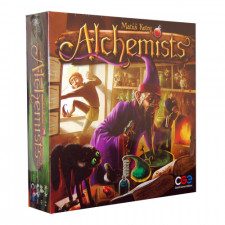Alchemists Review
on Mar 11, 2015
In Alchemists each player is transformed into a scholarly practitioner of alchemy, striving to make potions and discover the nature of his ingredients. The goal is to be the most reputable alchemist. This is often accomplished by publishing theories or debunking the false theories of others. Alchemists parodies both fantasy tropes and the vaunted aspirations of academia in an engaging and way- and it’s a fun game to boot.
Alchemists is a worker placement design but there is a strong deduction mechanic that works in tandem. The game has eight ingredients such as mandrake roots and mushrooms that can be combined to make one of six potions. Each ingredient is randomly assigned one of eight alchemicals. Each alchemical has a red, green or blue aspects with either a positive or negative property that is also either small or large. When two alchemicals are mixed, they make a potion if one of the colors shares the same plus or minus symbol but are different sizes. So an alchemical with a big red plus and one with a little red plus would combine to make a red plus potion. Poof! You’ve brewed a healing potion.
Like XCOM, Alchemists requires a free-to-download app, also available as a webpage, that tells you which potion is created when the ingredients are mixed. More significantly, it randomizes which alchemicals are assigned to which ingredients. So what you learned about the properties of Chicken Feet last play may not hold true in the next game.
The worker placement is just as interesting- and integral- as the flashy, app-assisted deduction element. The last player in the turn order places all of his workers first. That way, the first in turn order not only gets to take his actions first, but also gets to see what everyone else selected before making any decisions. Players can gather ingredients and if they choose to do so, transmute them for gold. The actions provide players with some fun, narrative options that give all of this potion-making a strong context.
One of the main actions is selling a potion to an adventurer, who needs magic potions for whatever their questing endeavors might be. Each adventurer wants very specific potions and insists on a guarantee from the selling player. An adventurer will pay four coins if you guarantee the potion to be correct. Three coins if you guarantee at least the symbol, but not the color. Two coins if you at least don’t do the opposite symbol. And one coin if your promise is, “I guarantee that I made this.†Of course, sell him something wrong, and he’ll badmouth you in town and cost you reputation.
Publishing your findings is an action that enables you to earn reputation. To publish your grand alchemical theory, you announce that you believe a particular ingredient- let’s say mandrake root- is a particular alchemical. Maybe you have enough research to believe that it is the green plus, blue minus, red minus. For publishing, you get a reputation and, if you publish enough, you’ll be awarded prestigious grants. You also place a seal down on your theory that either represents true commitment, or a bit of a hedge.
The seal becomes important when and if your theory is debunked. Someone might have published a theory that you know to be in error.. When you mixed mandrake root with something, you got a red plus potion. That means mandrake root has a red plus, not a red minus, and thus you can debunk the prevailing theory. Successfully debunking a theory gets you two reputation and flips your opponent’s seal. If it was true commitment to their theory, then they lose five reputation – a devastating loss. But if they hedged against red, then they lose nothing.
Experimenting on willing participants- including yourself- is another action. You simply mix two ingredients to see what you get. But the only way to know the result for sure is for someone to drink it. Sure, you could drink it yourself, but if it turns out to be negative, then the negative effect applies to you. You might lose a worker, go last in the next turn, or even lose reputation. So, it’s often better to have one of your students drink it for you. They are always eager to help. Each round, a student happily volunteers to sample your potions. That is, until he drinks a negative one. From then on, every subsequent player must pay him a gold to persuade them to keep drinking. Being poisoned or paralyzed really puts a damper on the young man’s enthusiasm.
Sometimes, though, it may be worth drinking potions yourself since that can be done for free. And, whatever the result, you get the same information from it. Sometimes (pseudo-)science calls for sacrifice.
In Alchemists, getting your head wrapped around the alchemicals is the most daunting task. But it’s actually fairly straightforward and once internalized the rest of the game falls into place. But this sucker is a brain melter. Deduction is important, and definitely helps you sell to adventurers and publish correct theories (or debunk fraudulent ones). But it is not the end-all, be-all of the game. Because Alchemists utilizes both worker placement and deduction, it feels unique. It works your mind in different ways, forcing you to discover and integrate your knowledge. It captures the feeling of a professor slowly piecing together the properties of ingredients through experiments.
Even though Alchemists is demanding in the brain-power department, the theme keeps the atmosphere light and entertaining. It doesn’t bog down or feel like a slog through various actions each round. The comical premise gives it a lighter tone despite being heavier than the typical eurogame.
Overall, I cannot recommend Alchemists highly enough. It’s sharp. Replay value is high. And gameplay is tense. If you get a chance to play this title, do so.

 Customer Support
Customer Support  Subscribe
Subscribe 




 Account
Account  Wishlist
Wishlist 

